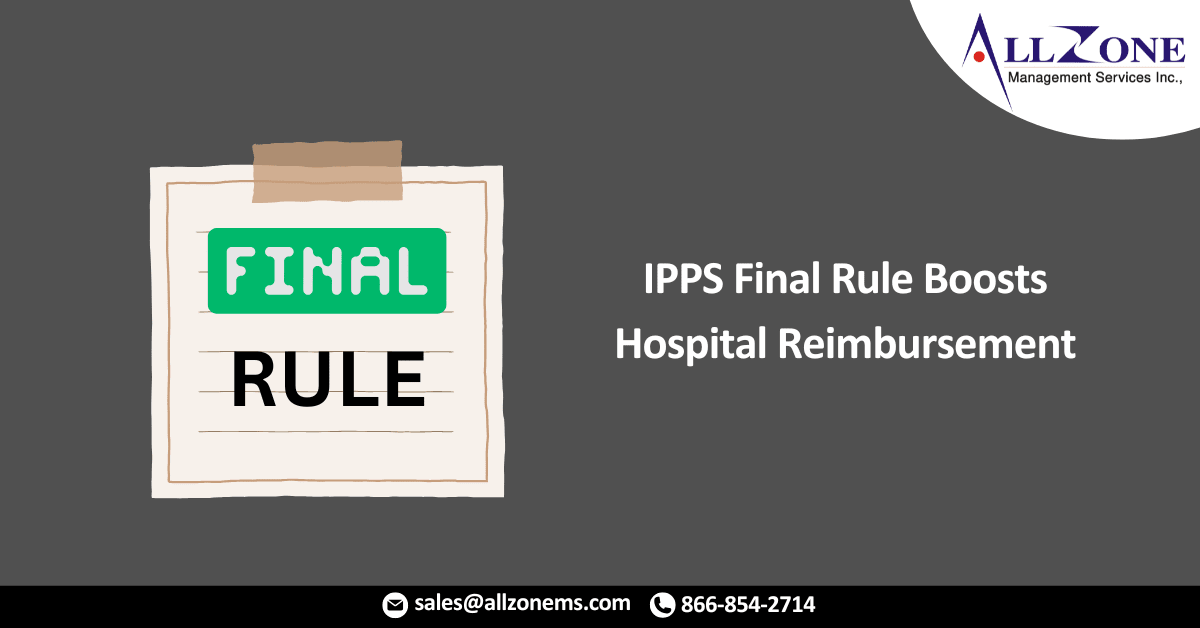On Aug. 2, 2021, the Centers for Medicare and Medicaid Services (CMS) posted the fiscal year (FY) 2022 Inpatient Prospective Payment System (IPPS) and Long-Term Care Hospital (LTCH) Prospective Payment System (PPS) final rule. Effective Oct. 1, the final rule updates Medicare payment policies and quality reporting programs for inpatient and long-term care hospitals and seeks to cushion the ongoing impact of the COVID-19 pandemic on hospital revenue and resources. This article provides an overview of key components of the final rule.
Payment Updates
Payment rates: Operating payment rates will increase by about 2.5 percent for general acute care hospitals paid under the IPPS that successfully participate in the Hospital Inpatient Quality Reporting (IQR) Program and are meaningful electronic health record users — increasing hospital payments by approximately $3.7 billion. The FY 2022 standardized amount for hospitals that meet these requirements will be $6,121.71, an increase of 2.7 percent compared to the final FY 2021 standardized amount.
The updated payment rate reflects the projected 2.7 market basket increase, with a 0.5 percent positive adjustment required by the Medicare Access and CHIP Reauthorization Act of 2015 and a 0.7 percent negative productivity adjustment.
CMS expects LTCH PPS payments will increase by roughly 1.1 percent ($42 million) in FY 2022.
Data Source for FY 2022 IPPS Ratesetting: Although CMS typically uses hospital utilization data from the previous FY when setting payment rates for the upcoming FY, the agency believes that wouldn’t be appropriate in this case. According to the final rule, this is due to the impact of the COVID-19 public health emergency (PHE) on inpatient utilization and case mix in FY 2020.
The COVID-19 vaccination rates in the Medicare population, coupled with the effectiveness of vaccines, led CMS to believe that there will be a significantly lower risk of COVID-19 infection and fewer hospitalizations for COVID-19 in FY 2022 than occurred in FY 2020. Because of this, CMS is using FY 2019 data from prior to the COVID-19 public health emergency to approximate the expected FY 2022 inpatient hospital utilization for weight-setting purposes.
NTAP and NCTAP
New Technology Add-on Payment (NTAP): As a one-time exception, also because of pandemic impacts, CMS will provide a one-year extension for 13 technologies whose NTAP period was scheduled to expire. When you factor in the 10 technologies that remain in their newness period for FY 2022, for which CMS is continuing NTAP, that brings the total NTAP extensions to 23 technologies. Plus, the agency approved 19 technologies that applied for NTAP in FY 2022.
In total, 42 technologies are eligible to receive add-on payments in FY 2022. CMS estimates that FY 2022 Medicare spending on NTAP will be approximately $1.5 billion, nearly a 77 percent increase over FY 2021 spending.
New COVID-19 Treatments Add-on Payment (NCTAP): In November 2020, CMS established the NCTAP to mitigate any potential disincentives for hospitals to provide new COVID-19 treatments during the PHE. CMS is extending the NCTAP for MS-DRG payments for eligible COVID-19 products through the end of the FY in which the PHE ends.
Hospitals will be eligible to receive both the NCTAP and the traditional new technology add-on payment for qualifying patient stays through the end of the FY in which the COVID-19 PHE ends, with NTAP reducing the amount of the NCTAP.
Other Key Provisions of FY 2022 IPPS Final Rule
Other policies outlined in the FY 2022 IPPS/LTCH PPS final rule include:
Distribution of $7.2 billion in uncompensated care payments for FY 2022, a decrease of approximately $1.1 billion from FY 2021.
Adoption of new measures to the Hospital IQR Program: Maternal Morbidity Structural measure. the COVID-19 Vaccination Coverage Among Health Care Personnel measure, Hybrid Hospital-Wide All-Cause Risk Standardized Mortality measure, as well as two medication-related adverse event electronic clinical quality measures (eCQMs) — Hospital Harm-Severe Hypoglycemia eCQM (NQF #3503e) and Hospital Harm-Severe Hyperglycemia eCQM (NQF #3533e).
Temporary suppression of certain measures in its hospital quality measurement and value programs for the duration of the COVID-19 PHE “to ensure that these programs neither reward nor penalize hospitals based on circumstances caused by the PHE for COVID-19 that the measures were not designed to accommodate,” CMS explains in the final rule.
Repeal of the requirement that a hospital report on its Medicare cost report the median payer-specific negotiated charge that the hospital has negotiated with all its Medicare Advantage organizations, by MS-DRG, for cost reporting periods ending on or after Jan. 1, 2021.
Repeal of the market-based MS-DRG relative weight methodology that was adopted effective for FY 2024. Continue using the existing cost-based MS-DRG relative weight methodology to set Medicare payment rates for inpatient stays for FY 2024 and subsequent fiscal years.
The final rule also includes additional provisional changes affecting:
Hospital Inpatient Quality Reporting Program
Medicare Promoting Interoperability Program
PPS-exempt Cancer Hospital Quality Reporting Program
Hospital Readmissions Reduction Program
Hospital-Acquired Condition Reduction Program
Hospital Value-Based Purchasing Program
Long Term Care Hospital Quality Reporting Program
Medicare Shared Savings Program
More to Come
Notably, the rule does not finalize proposed policies related to payments for direct graduate medical education and indirect medical education, disproportionate share hospital payments, and organ acquisitions outlined in the proposed rule. Instead, CMS will address these provisions in future rulemaking.
The FY 2022 IPPS final rule will be issued in multiple parts CMS explained. Specifically, the agency will address its proposal to implement several provisions of the Consolidated Appropriations Act, including distribution of 1,000 additional Medicare-funded physician residency slots phased in over 5 years, in subsequent parts of the final rule. CMS also outlines comments it received on its requests for information (RFIs) regarding potential stratification of quality measures, demographic data collection, and health equity, noting that it “will consider this input carefully in developing future policies.”
For More Information: 81745 2022 ipps final rule boosts hospital reimbursement

